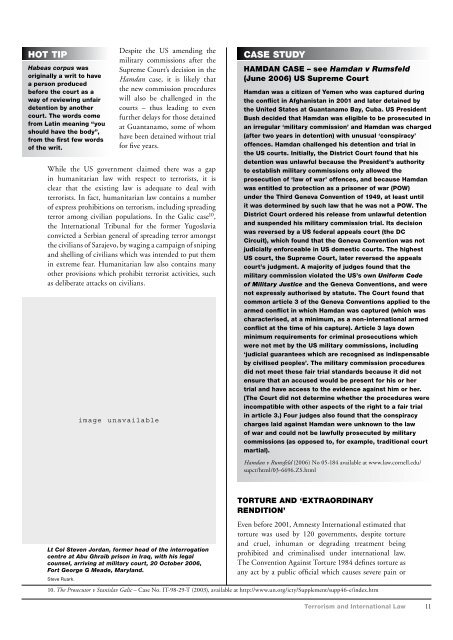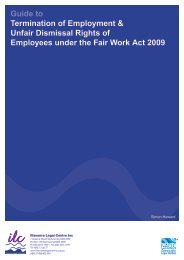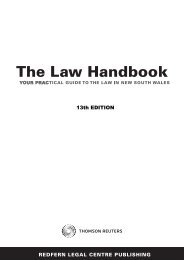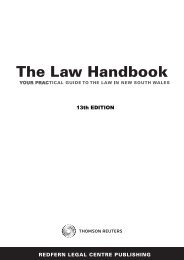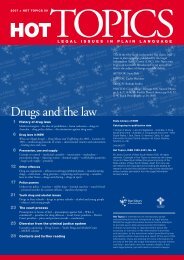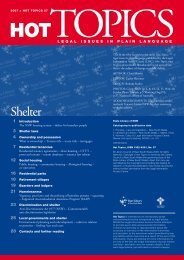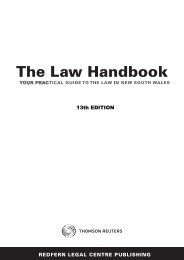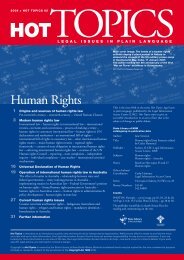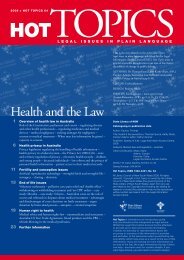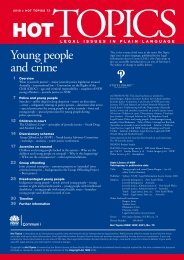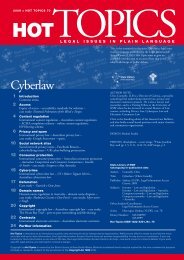HOT TipHabeas corpus wasoriginally a writ to havea person producedbefore the court as away of reviewing unfairdetention by anothercourt. the words comefrom Latin meaning “youshould have the body”,from the first few wordsof the writ.Despite the US amending themilitary commissions after theSupreme Court’s decision in theHamdan case, it is likely thatthe new commission procedureswill also be challenged in thecourts – thus leading to evenfurther delays for those detainedat Guantanamo, some of whomhave been detained without trialfor five years.While the US government claimed there was a gapin humanitarian law with respect to terrorists, it isclear that the existing law is adequate to deal withterrorists. In fact, humanitarian law contains a numberof express prohibitions on terrorism, including spreadingterror among civilian populations. In the Galic case 10 ,the International Tribunal for the former Yugoslaviaconvicted a Serbian general of spreading terror amongstthe civilians of Sarajevo, by waging a campaign of snipingand shelling of civilians which was intended to put themin extreme fear. Humanitarian law also contains manyother provisions which prohibit terrorist activities, suchas deliberate attacks on civilians.image u navailableCase sTuDyHamDan Case – see Hamdan v Rumsfeld(June 2006) us supreme Courthamdan was a citizen of Yemen who was captured duringthe conflict in afghanistan in 2001 and later detained bythe united states at guantanamo Bay, cuba. us presidentBush decided that hamdan was eligible to be prosecuted inan irregular ‘military commission’ and hamdan was charged(after two years in detention) with unusual ‘conspiracy’offences. hamdan challenged his detention and trial inthe us courts. initially, the District court found that hisdetention was unlawful because the president’s authorityto establish military commissions only allowed theprosecution of ‘law of war’ offences, and because hamdanwas entitled to protection as a prisoner of war (poW)under the third geneva convention of 1949, at least untilit was determined by such law that he was not a poW. theDistrict court ordered his release from unlawful detentionand suspended his military commission trial. its decisionwas reversed by a us federal appeals court (the Dccircuit), which found that the geneva convention was notjudicially enforceable in us domestic courts. the highestus court, the supreme court, later reversed the appealscourt’s judgment. a majority of judges found that themilitary commission violated the us’s own Uniform Codeof Military Justice and the geneva conventions, and werenot expressly authorised by statute. the court found thatcommon article 3 of the geneva conventions applied to thearmed conflict in which hamdan was captured (which wascharacterised, at a minimum, as a non-international armedconflict at the time of his capture). article 3 lays downminimum requirements for criminal prosecutions whichwere not met by the us military commissions, including‘judicial guarantees which are recognised as indispensableby civilised peoples’. the military commission proceduresdid not meet these fair trial standards because it did notensure that an accused would be present for his or hertrial and have access to the evidence against him or her.(the court did not determine whether the procedures wereincompatible with other aspects of the right to a fair trialin article 3.) Four judges also found that the conspiracycharges laid against hamdan were unknown to the lawof war and could not be lawfully prosecuted by militarycommissions (as opposed to, for example, traditional courtmartial).Hamdan v Rumsfeld (2006) No 05-184 available at www.law.cornell.edu/supct/html/03-6696.ZS.htmlLt Col Steven Jordan, former head of the interrogationcentre at Abu Ghraib prison in Iraq, with his legalcounsel, arriving at military court, 20 October 2006,Fort George G Meade, Maryland.Steve Ruark.TOrTure anD ‘exTraOrDinaryrenDiTiOn’Even before 2001, Amnesty International estimated thattorture was used by 120 governments, despite tortureand cruel, inhuman or degrading treatment beingprohibited and criminalised under international law.The Convention Against Torture 1984 defines torture asany act by a public official which causes severe pain or10. The Prosecutor v Stanislav Galic – Case No. IT-98-29-T (2003), available at http://www.un.org/icty/Supplement/supp46-e/index.htmterrorism and international Law 11
suffering (physical or mental) to another person, for anyof the following purposes:> to obtain information or a confession from theperson;> to punish an act the person has committed or issuspected of committing;> to intimidate or coerce the person or a third person;or> to discriminate against the person.After 11 September 2001, the use of torture appears tohave accelerated in the fight against terrorism. Reliablereports of the abuse and torture or detainees in UScustody in Afghanistan and Iraq have emerged, includingdeaths in custody. An internal US Army report in 2003found there were numerous cases of ‘sadistic, blatant,and wanton criminal abuses’ at Abu Ghraib prison inIraq, revealed in shocking photographs in the media,while British personnel have also been disciplined formistreating prisoners in Iraq. The US has also sought toexcept its Central Intelligence Agency (CIA) from thelegal controls applying to other US personnel. A UnitedNations report has documented the serious mentalhealth effects of prolonged detention, with 350 acts ofself-harm at Guantanamo Bay in 2003 alone. While theUS has brought to justice some of the military personnelresponsible for mistreating prisoners, many sentenceshave been too light given the serious crimes committed.A British court even allowed evidence obtained bytorture to be used in court, until the House of Lords(Britain’s highest court) overturned the decision (see A vSecretary of State for the Home Department 11 ).The torture and abuse raises a number of legal issues.First, the US and its lawyers argued that some aggressiveinterrogation techniques do not amount to tortureand are therefore permissible. These techniques areknown by a range of euphemisms: ‘counter-resistancestrategies’; ‘stress and duress’; ‘professional interrogationtechniques’; ‘highly coercive interrogation’; ‘cruel,inhuman and degrading’; and ‘torture lite’. They includesleep or light deprivation, continuous light or noiseexposure, withholding food and water or medicaltreatment, prolonged solitary confinement, exposureto temperatures, forced standing in painful positions,hooding or blindfolding, shackling, and forced nudity.The US Attorney-General, Alberto Gonzales, even arguedthat pain only amounts to torture if it is ‘equivalent inintensity to the pain accompanying serious physicalinjury, such as organ failure, impairment of bodilyfunction, or even death.’ This is despite such techniqueshaving been condemned as torture or ill-treatment by theUN Human Rights Committee, the European Courtof Human Rights, and the Israeli Supreme Court. TheUS has taken advantage of the fact that the ConventionAgainst Torture does not list specific prohibited actsof torture, leaving room for governments to argue thatcertain uses of force or interrogation do not constitute‘severe’ pain or suffering.Secondly, the US has ‘contracted out’ the torture andinterrogation of terrorist suspects to less scrupulouscountries (such as Syria, Morocco, Jordan, SaudiArabia, Egypt and even the new Iraqi authorities), orirregular armed forces (such as the Northern Alliancein Afghanistan before the fall of the Taliban). Suspectsare typically sent to countries where the risk of tortureis well-known, in the hope that useful intelligenceinformation can be extracted from them in foreigncustody and passed on to the rendering country. By usingillegal ‘irregular renditions’ to transfer suspects to othercountries, the US avoids the procedural protections inimmigration and extradition laws. Diplomatic assurancessupposed to guarantee the treatment of returnees havefrequently been found to be ineffective.Irregular renditions violate international law, sincethe Convention against Torture prohibits returning aperson to torture, and customary international law alsoprohibits sending someone back to cruel, inhuman ordegrading treatment or punishment. One Australiancitizen, Mamhdouh Habib, alleges that he was informallyrendered from Pakistan to Egypt by the US, and torturedwhile in Egyptian custody. Even Sweden was criticisedby the UN Human Rights Committee for returning anEgyptian asylum seeker to probable torture in Egypt,based on secret evidence that he was a terrorist suspect.A Council of Europe investigation discovered that manyEuropean countries allowed secret US aircraft to illegallytransfer detainees.Case sTuDymamdouh Habibhabib was born in egypt, but moved to australia in 1980.he taught islamic scripture at a local high school. in July2001, he travelled to pakistan. according to his wife, thefamily was considering relocating there and habib went toassess schools for his four children. after the 9/11 attacks,habib was arrested in pakistan. he was flown to egyptthrough an ‘irregular rendition’ and allegedly torturedthere. he says he was beaten, given electric shocks,deprived of sleep, and injected with substances. he wassubsequently taken to afghanistan, and then sent on toguantanamo Bay in May 2002. although never formallycharged with any crime, the us alleged that he had trainedal-Qaeda militants and had advance warning of the 11september attacks. since the us declined to charge him,the australian government requested his repatriation toaustralia. he was released in January 2005. there werequestions about whether the australian government knewabout his maltreatment in egypt at the time.11. [2005] UKHL 71, available at http://www.bailii.org/uk/cases/UKHL/2005/71.html12HOT TOPICS <strong>58</strong> > <strong>Terrorism</strong>


